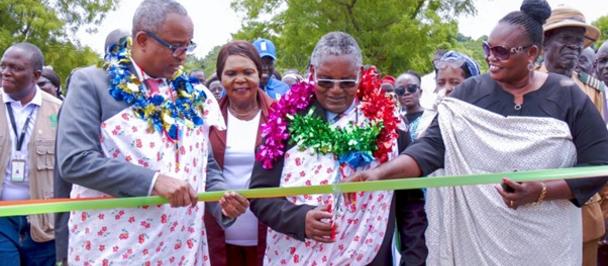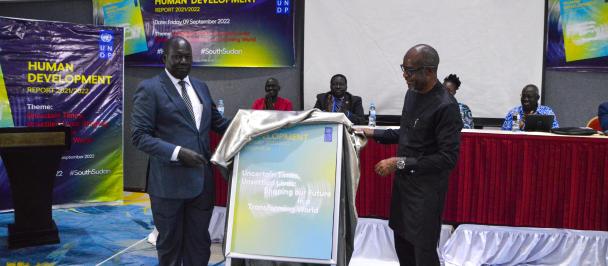UNDP & Partners Launch $33 million Project to Enhance Climate Resilience and Strengthen Sustainable Development in South Sudan
May 20, 2024

Group photo with different stakeholders at the Launch event of WACRESS in Juba, South Sudan
On the 15th of May 2024, The United Nations Development Programme (UNDP) spearheaded the launch of a groundbreaking project titled “Watershed Approaches for Climate Resilience in Agro-pastoral Landscapes” in South Sudan. This initiative marks a significant step towards strengthening the country's resilience to climate change impacts while promoting sustainable development and economic empowerment among vulnerable communities.
Funded by the Global Environment Facility (GEF) and implemented by World Vision South Sudan in partnership with the Ministry of Environment and Forestry, the project is designed to restore ecosystems, strengthen market linkages, and support gender-responsive, climate-smart agricultural practices. Through a participatory watershed-based approach, the project aims to address the root causes of vulnerability and build resilience among agro-pastoral communities, particularly in the face of prolonged conflict and escalating climate change.
In a significant move to reinforce partnership and commitment, the United Nations Development Programme (UNDP), along with World Vision and the Ministry of Environment and Forestry of South Sudan, convened on May 2, 2024, for the signing of a Memorandum of Understanding (MOU) for the project which was a precursor to the launch.
The launch event was attended by key stakeholders including government officials and development partners, who emphasized the project's significance amidst the challenges posed by climate change and conflict. UNDP's Deputy Resident Representative, Mr. Titus Osundina, re-iterated the project's objective of enhancing livelihoods and building resilience among vulnerable populations.
With a budget of $33million, the project aims to reach over 75,000 individuals and improve 15,000 hectares of land with modern agricultural practices, contributing to the achievement of Sustainable Development Goals (SDGs) such as Zero Hunger, Gender Equality, and Climate Action.
This significant initiative aims to tackle the pressing issues of food insecurity and environmental degradation in South Sudan. With the majority of the population relying on climate-sensitive natural resources, the combined effects of prolonged conflict and climate change have severely impacted agricultural and pastoral sectors, highlighting the urgent need for sustainable solutions.
Josephine Napwon, Minister of Environment and Forestry, highlighted the urgency of addressing climate change and reiterated the government's commitment to mitigating its impacts. She emphasized the project's potential to introduce smart agriculture strategies and transform agricultural practices, ultimately improving community resilience and livelihoods.

Mr Titus Osundina, Deputy Resident Representative UNDP & Hon. Josephine Napwon, Minister of Environment & Forestry
While Dr. Mesfin Lola, World Vision Country Director, concurred with the importance of having a collective effort in building resilience to climate change risks and restoring ecosystems. He highlighted the project's focus on strengthening local protection mechanisms and enhancing sustainable development in South Sudan.
According to World Food Program (WFP), the situation in South Sudan is dire, with approximately 7.7 million people facing severe food insecurity. Four consecutive years of unprecedented flooding have caused widespread displacement, destruction of livelihoods, and loss of arable land, severely impacted food production and increasing hunger. The livelihoods of 95% of South Sudan's communities and its economy depend heavily on climate-sensitive natural resources and agriculture. The ongoing conflict and insecurity have disrupted these livelihoods, making recovery and sustainability challenging.
A significant proportion of South Sudan's population comprises vulnerable groups, such as Internally Displaced Persons (IDPs) and persons with disabilities, who are particularly affected by the food insecurity crisis. Agricultural production in South Sudan is highly dependent on rainfall, with variability in rainfall being the greatest determinant of agricultural output.
This variability causes both droughts and floods, accounting for nearly 70% of the variation in cereal and grain production. To address this crisis, it is crucial for communities in South Sudan to adapt to climate change by adopting climate-smart agricultural techniques and technologies that are locally relevant to effectively rebuild and sustain livelihoods. The Watershed Approaches for Climate Resilience in Agro-pastoral Landscapes is designed to resolve for such problem statements.
The launch of the “Watershed Approaches for Climate Resilience in Agro-pastoral Landscapes” project represents a significant milestone in UNDP's commitment to supporting South Sudan's journey towards climate resilience and sustainable development. Through collaboration, innovation, and inclusivity, the project aims to empower vulnerable communities, enhance livelihoods, and build resilience to climate change impacts, ultimately contributing to a more sustainable and prosperous future for all. The project’s pilot will be in Northern Bahr El-Ghazal, Aweil East &Aweil Center.
Article written by: Maureen Anduro Omwanda
Stay tuned for updates on the project's progress and impact on the UNDP website.

 Locations
Locations

